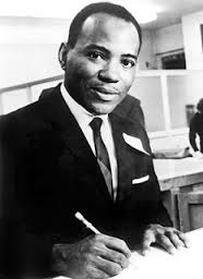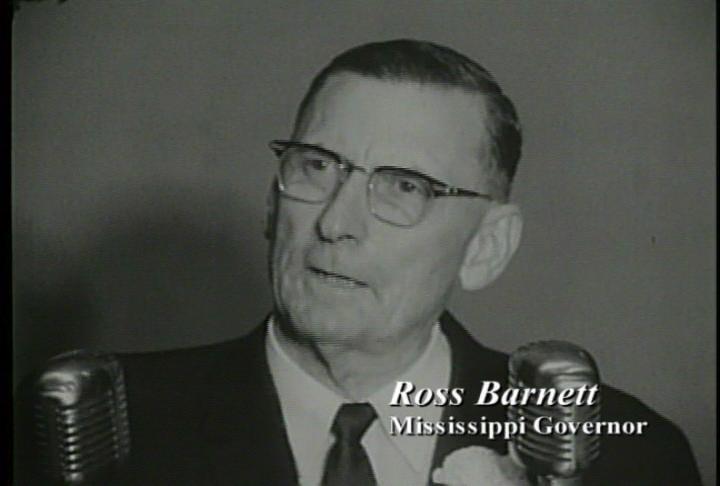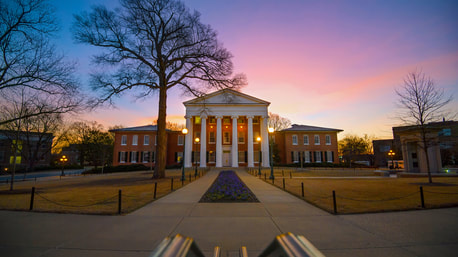
The sixties were a pivotal and troubling time for our nation. President Kennedy had to make unpopular decisions in this time period for the future of America. One specific story that proves this is about James Meredith, an Air Force veteran, who was born on June 25, 1933, in Kosciusko, Mississippi (About James). Meredith wanted to attend the University of Mississippi. Meredith would face great backlash and he would be caught in the middle of a heated fight between the government and the deep south. Meredith would be attempting to enroll while the democratic president was John F. Kennedy. The University sent him a telegram stating that he has not been admitted to the University. After this, Meredith filed a suit against them with the NAACP. The Supreme Court ruled that Meredith would be admitted. Governor Ross Barnett did not comply with the Supreme Court ruling of the admittance of James Meredith, so John Fitzgerald Kennedy was forced to intervene. Sept. 30, 1962 the President mobilized the National Guard and called in Army troops from Memphis to maintain law and order in Oxford, MS. Because of this outcome, many riots broke out in Oxford, the main one at the Lyceum (History.com).
This battle between the state of Mississippi and the federal government had a civil war type feeling. Ole Miss was considered the most prestigious and tradition based school in Mississippi, and there had never been an African-American attend the university before. So this idea was very troubling to most southerners and they became violent while trying to support their beliefs. Ross Barnett stated, “We will not surrender to the evil and illegal forces of tyranny." This was seen as a powerful, oppressive, federal act that the south did not agree with. A battle between federal and states’ rights. Barnett defended Mississippi's segregationist laws, however, Kennedy made it very clear to Barnett that he had a responsibility to uphold federal law. "What I'd like to do is for this to work out in an amicable way," Kennedy said to Barnett in a phone call. "We don't want a lot of people down there getting hurt."
Bobby Kennedy actually would have lots of calls with Barnett, and eventually the Kennedy's would reach a deal. Meredith would show up to campus with guards, Barnett would show his resistance and power and then step aside. The southern democrat from Mississippi and the preppy democrat from Massachusetts butted heads over desegregation of the south's beloved university. This plan had to be aborted as word got out about Meredith's acceptance and both Barnett and Kennedy at this point feared huge violent riots (The Mississippi).
JFK Would attempt to define his presidency by aiding Civil Rights and he had the opportunity to with many southern universities integrating at this time. JFK stated that, "It ought to be possible, in short, for every American to enjoy the privileges of being American without regard to his race or his color. In short, every American ought to have the right to be treated as he would wish to be treated, as one would wish his children to be treated. But this is not the case…"
"....This is not a sectional issue…Nor is this a partisan issue…This is not even a legal or legislative issue alone. It is better to settle these matters in the courts than on the streets, and new laws are needed at every level, but law alone cannot make men see right" (Kennedy).
Robert F. Kennedy - “I will send the Marshals that I have available up there in Memphis and there will be about 25 or 30 of them and they will come with Mr. Meredith and they will arrive at wherever the gate is and I will have the head Marshal pull a gun and I will have the rest of them have their hands on their guns and their holsters. And then as I understand it, they will go through and get in and you will make sure that law and order is preserved and that no harm will be done to Mr. McShane and Mr. Meredith" (The Mississippi).
Protesters were protesting at the Lyceum at the University. Marshals threw tear gas, rocks and bottles were thrown by the protesters at the Marshals. Bricks were thrown, Marshals were hit with these objects. People from other regions of the south traveled just to protest. The Kennedy association did not send black Marshals, because they knew it would make the riots worse. The 503rd military police battalion showed up to Oxford, MS. One hundred twenty seven deputy marshals. Of the 538 deputies who went to Ole Miss, one-hundred and sixty were injured, twenty-eight of them by gunfire. US Marshals would hold the line for 11 hours at the Lyceum. Molotov cocktails were being thrown and high powered rifles shot. Once Meredith enrolled, he wasn’t attacked once. He had Marshals escort him for his first year of school (Ole Miss).
James Meredith - “I came back for a second semester because I saw signs that gave me hope that I will be able to go to school in the future under adequate, if not ideal, conditions. No student should have to be subjected to the sort of fanfare I underwent during the first semester. Though no price is too high to pay for liberation, I am convinced that you can pay a price for one piece of freedom that is greater than the benefits you get. We all have to decide how best to utilize our time, our energy" (History Matters).
|
Works Cited
"About James Meredith." UM History of Integration, 50years.olemiss.edu/james-meredith/. Elliot, Debbie. "Integrating Ole Miss: A Transformative, Deadly Riot." NPR, 1 Oct. 2012, www.npr.org/2012/10/01/161573289/integrating-ole-miss-a-transformative-deadly-riot. History.com. www.history.com/topics/us-presidents/john-f-kennedy-on-desegregation-at-ole-miss-video. History Matters. historymatters.gmu.edu/d/6326/. Kennedy, John Fitzgerald. "John F. Kennedy's Address on Civil Rights." PBS, www.pbs.org/wgbh/americanexperience/features/president-kennedy-civil-rights/. "The Mississippi Crisis." American Public Media, americanradioworks.publicradio.org/features/prestapes/a1.html. Ole Miss Integration. olemissintegration.weebly.com/night-of-riots.html. |


